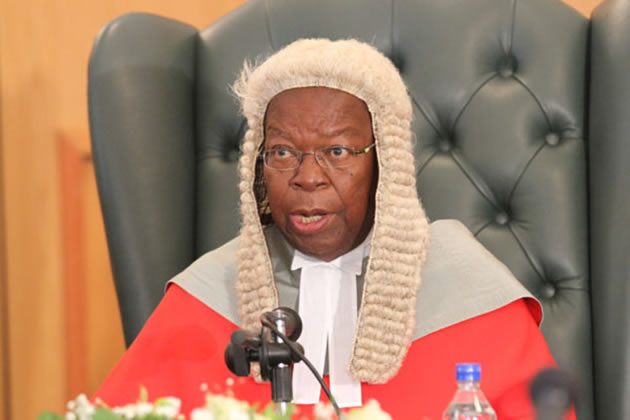By Gift Phiri
The Judicial Services Commission (JSC) will hold public interviews on Monday to fill the chief justice (CJ) vacancy.

Chief Justice Godfrey Chidyausiku is retiring from the Bench at the end of February, stepping down from the most powerful position in the judiciary after joining the Supreme Court in March 2001. He has reached the 70-year mandatory retirement age.
The JSC will be conducting public interviews of four candidates seeking appointment as chief justice of Zimbabwe in succession to Chidyausiku. The JSC has said it is looking for a CJ who exudes “competence, integrity and independence”.
The post of successor chief justice is likely to be hard fought.
Those short-listed are Deputy Chief Justice Luke Malaba; Justice Paddington Shadreck Garwe, a judge of the Supreme Court; Justice Rita Tambudzai Makarau, a judge of the Supreme Court and Justice George Mutandwa Chiweshe, the judge-president of the High Court, said to be a hot favourite of the Munhumutapa establishment.
The proceedings, which will be open to members of the public, are scheduled for the Jacaranda Room at the Rainbow Towers Hotel in Harare at 9am on Monday.
The interviews are an important part of the appointment process for the position of chief justice, as laid down in section 180 of the Constitution.
The interviews will be conducted by the members of the JSC.
A new Constitution adopted in 2013 which trims President Robert Mugabe’s powers no longer allows the nonagenarian to appoint judges on his own authority. According to the new charter, the public will propose candidates, who will then be interviewed by JSC.
After the interviews, the JSC will then decide on a list of three nominees and submit the list to the president. This will involve eliminating one of the four candidates.
The president will then appoint one of the three nominees as chief justice, unless he considers that none of the three is suitable for the post. In that highly-unlikely event, section 180(3) of the Constitution allows him to require the JSC to submit one further list of three qualified persons, according to legal experts.
The chief justice also oversees the Con-Court and Supreme Court’s administration and lobbies on the top court’s behalf on matters involving its docket and jurisdiction.
The CJ job also has a political nature, and has a key role in presidential impeachment motions and elections, which are often disputed here.
There are lingering concerns that some Zimbabwean judges are generally subject to political control.
In 2008, Mugabe splurged German cars, Japanese SUVs and plasma screen TVs, purchased at the expense of Zimbabwe’s poor and sick, using the monopoly money emerging from the printing presses of the central bank.
The incoming CJ will also have to head the Con-Court as well until 2023, according to the new Constitution.
Technically, potential assignees that have been seriously bandied about so far include the Judge President Chiweshe and Makarau, the present chairperson of the Zimbabwe Electoral Commission (Zec), who was the first female judge president of Zimbabwe.
Legal experts argue that using the promotion option, making the deputy CJ Malaba take over, was probably self-evident because experience on the Supreme Court may be helpful in leading it, but his major disadvantage was that he was headed for retirement soon.
Mugabe is likely to make his selection as a matter of political pragmatism, and legal experts claim he is likely to give serious consideration to former Zec chairman Chiweshe, who rolled out an elaborate electoral recovery strategy after Mugabe lost elections to MDC leader Morgan Tsvangirai in the historic 2008 presidential polls. Daily News






